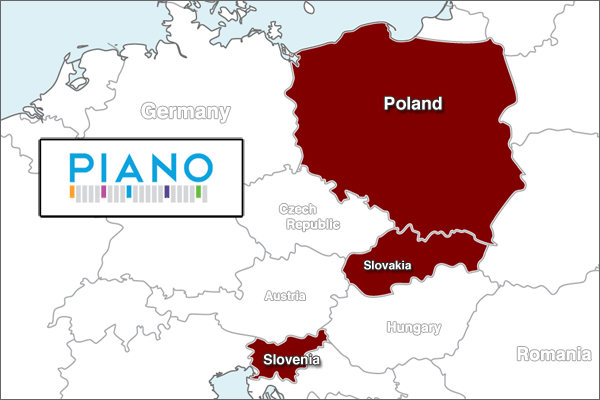

Piano Media, the Slovakian company with plans to erect a pan-European paywall, expanded today into its third and largest market, Poland. Seven major media companies have agreed to put some of their content behind a single national paywall.
The company is betting on the cable TV approach to news: Pay once, log in once, get access to a diverse package of content (including stuff you might not care about). Piano gets a 30 percent cut of the proceeds and divvies up the rest based on which partner sites get the most traffic. The company says its model is a success in Slovakia and Slovenia, though it won’t provide sales data.
Forty-two websites are included in the Polish package, including major daily newspapers, magazines, and Polish National Radio. After a free trial period, Piano will charge about $5.85 a month (19.90 zlotys) or about $58 per year (199 zlotys).
Among those sites is Forbes.pl, which is putting about 10 percent of its content — mostly commentary and analysis — behind the paywall. That site’s participation is notable because it’s owned by Ringier Axel Springer, a joint venture that includes Axel Springer, the largest publisher in Europe — which means the potential impact of a success could be much broader.
Aleksy Uchanski, chief digital officer for Ringier Axel Springer Poland, said Forbes.pl makes sense as a test site because it offers “premium or super-premium content,” the kind of niche journalism that might persuade Poles to pay. Forbes.pl wants to avoid walling off its whole website, lest new users turn away in droves. This is a cautious experiment for the company.
“Paid content in Poland is a 2012 topic — this is a topic that started this year, more or less,” Uchanski told me from his office in Warsaw. People are not accustomed to paying for news. Piano hopes the convenience of a single, low-cost subscription will help reset years of consumer expectations about free content. (That problem is not unique to Poland, I assured him.)
It gets more complicated: “A lot of people (in Poland) still don’t have credit cards,” Uchanksi said, “while others are still extremely afraid of using credit cards in online transactions.” A popular payment method is by way of SMS, in which users pay for services by tacking the fee on to a cellphone bill. Polish telcos take a staggering 50 percent cut of each payment, which means SMS payments are a non-starter for Piano. (Piano accepts SMS payments in Slovakia and Slovenia, where telcos take a 20 percent cut of each payment.)
Peter Richards, who is managing the Poland expansion for Piano, says he aims to convert 0.5 to 1.5 percent of Poles to paying users. “Based on our data after 14 months of operations, there are definitely high income, educated, urban users who comprise this 1% average,” he wrote in an email. “If we have half of the Polish Internet in our package at launch, then one could assume it’s possible that 100,000 Poles could pay. The real question is whether they see value for the money they pay and in our case for the price of two coffees you can have access to 42 websites.”
Richards said he found 40 percent of printed content in Poland is not made available online. Some publishers plan to offer paid access to this material, a unique selling proposition. For publishers in Poland or anywhere, the fear of erecting a paywall is that it will cut into pageviews, which sell ads. Piano does not “cannibalize ad revenues but provides a new revenue stream to publishers,” Richards said. The company provides reams of data and market research to help publishers determine which content goes premium.
“It’s a bit of a craps game when you launch,” he said. “We conduct a detailed content analysis of the site using quantitative and qualitative techniques. Publishers get a massive report explaining our rationale for including a particular piece of content in Piano’s system. Ultimately it’s up to them to decide what to close.”
Poland, with 38 million people and 19 million Internet users, is a big leap in scale for Piano, compared to Slovakia’s 5 million people and Slovenia’s 2 million. Like its predecessors, though, Poland is a single-language country whose media is relatively isolated — likely a better fit for a national paywall than other, larger European countries. Piano would probably have a much tougher time in the geographically expansive, multilingual United States. (Can you imagine Dow Jones and The New York Times Co. agreeing to unite behind a common paywall?)
Uchanksi said he has no fixed expectations for Forbes.pl; he does not yet know what a “successful” number of subscribers would be. The site attracts about 400,000 unique visitors per month, Uchanski said, and about 2 million page views. Ringier Axel Springer runs news sites 10 times that size, he said. He will study the data carefully over the next several months.
“How does [a] paying user behave in this situation? How does [a] nonpaying user behave? How much do paying users want to spend? And what’s the retention rate of those users? Et cetera. I don’t have a feeling that this is a ready-made business model. It’s a beginning,” Uchanski said.
Piano says it is “in negotiations with publishers on several continents” and plans to launch in another market by the end of 2012.